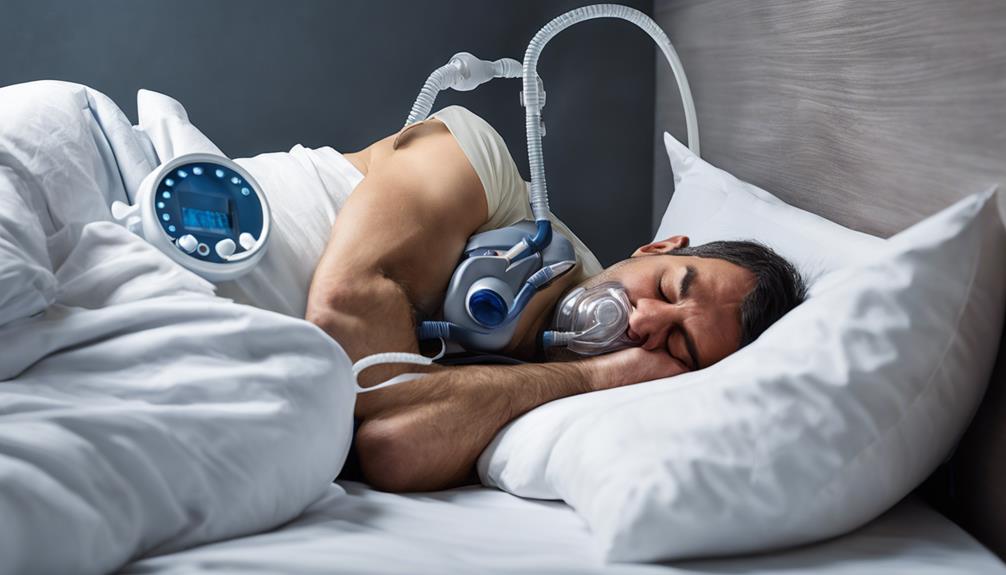If you are wondering, ‘Do you know if you have sleep apnea?’ look out for common signs like loud snoring, choking sensations, or morning headaches. Risk factors include obesity, family history, and hypertension. It is crucial to seek a diagnosis through sleep studies with specialists. Untreated sleep apnea can result in fatigue, cognitive issues, and heart problems. Lifestyle changes such as weight loss and exercise can be beneficial, but self-diagnosing is not recommended. Trust professionals for accurate care to enhance sleep and overall health. For more information on symptoms, diagnosis, and treatment, refer to the following link for a comprehensive understanding.
Key Takeaways
- Recognize symptoms like loud snoring, daytime fatigue, morning headaches, and gasping for air during sleep.
- Consider risk factors such as obesity, hypertension, diabetes, and family history of sleep apnea.
- Seek evaluation from a specialist for a precise diagnosis through physical exams and sleep studies.
- Do not self-diagnose; consult healthcare providers for accurate assessment and tailored treatment.
- Address underlying causes promptly to prevent complications like cardiovascular issues and cognitive impairment.
Common Symptoms of Sleep Apnea
Recognizing common symptoms can aid in identifying potential cases of sleep apnea. Loud snoring, gasping, and choking during sleep are key indicators of this condition.
If you or a loved one experiences these symptoms, it's important to take into account the possibility of sleep apnea. Additionally, waking up with a dry or sore throat, along with morning headaches, can also point towards this sleep disorder.
Breathing problems such as restless sleep, frequent awakenings, and difficulty falling asleep may be signs that shouldn't be overlooked. Daytime fatigue, lack of energy, and sleepiness while driving could be linked to sleep apnea, affecting your daily life and productivity.
Monitoring blood oxygen levels and addressing issues like snoring are vital steps in identifying potential cases of obstructive sleep apnea. By paying attention to these symptoms and seeking medical advice promptly, you can address sleep apnea before it impacts your overall well-being. Left untreated, sleep apnea can lead to more serious health problems, including cardiovascular issues, daytime fatigue, and cognitive difficulties. Recognizing snoring and its link to apnea is an essential step in initiating timely interventions and improving sleep quality. Early diagnosis and treatment can significantly enhance both your overall health and quality of life.
Risk Factors to Consider

When contemplating the risk factors for sleep apnea, it's important to understand the various elements that can contribute to the development of this sleep disorder. Factors such as obesity play a vital role as excess weight can lead to airway obstruction during sleep, increasing the likelihood of experiencing sleep apnea.
Anatomical factors like narrow airways also heighten the risk of developing obstructive sleep apnea. Medical conditions such as hypertension and diabetes are linked to a higher probability of encountering sleep apnea issues. Additionally, lifestyle factors like smoking can contribute to the development of obstructive sleep apnea.
Certain demographics, including male gender, family history of sleep apnea, and postmenopausal status in women, are further risk factors to take into account when evaluating the possibility of sleep apnea. Understanding these various risk factors can help individuals recognize potential symptoms and seek appropriate medical attention to address sleep apnea concerns promptly.
Understanding Sleep Apnea Diagnosis
Understanding how sleep apnea is diagnosed is essential for individuals who suspect they may be experiencing symptoms of this sleep disorder. Diagnosis often involves a sleep study known as polysomnography, which monitors breathing patterns, brain activity, heart rate, and oxygen levels during sleep. Additionally, home sleep apnea tests can be utilized in specific cases, offering convenience and comfort for the patient during the assessment process.
Symptoms such as daytime sleepiness, snoring, gasping for air during sleep, and morning headaches are evaluated during the diagnostic process. Seeking an evaluation from a sleep specialist or physician is vital for an accurate diagnosis and to determine the severity of sleep apnea. This assessment is pivotal in tailoring appropriate treatment strategies to effectively manage the condition and enhance overall sleep quality.
Impact of Untreated Sleep Apnea

Untreated sleep apnea poses significant health risks, including severe daytime fatigue, impaired cognitive function, and a heightened susceptibility to cardiovascular issues like heart disease and stroke. When we've obstructive sleep apnea, our breathing pauses or becomes shallow during sleep, leading to lower oxygen levels in the blood. This lack of oxygen strains the heart and can contribute to cardiovascular problems over time.
The risk of daytime fatigue is a serious consequence, impacting our daily activities and productivity. Additionally, untreated sleep apnea can affect our cognitive function, making it harder to concentrate and increasing the likelihood of accidents.
For children with untreated sleep apnea, the effects can be particularly concerning, potentially causing academic and behavioral challenges due to disrupted sleep patterns. Furthermore, when managing medications or undergoing surgeries, untreated sleep apnea can complicate these situations, emphasizing the importance of addressing sleep apnea to safeguard overall health and well-being.
Lifestyle Changes for Sleep Apnea
To make lifestyle changes for sleep apnea, focus on dietary adjustments and the benefits of regular exercise. Shedding excess weight can help reduce airway obstruction. Engaging in physical activity can enhance breathing patterns and overall sleep quality. Incorporating these changes can contribute to managing sleep apnea symptoms effectively.
Dietary Changes for Apnea
Making dietary changes is essential for managing sleep apnea, with a focus on consuming a Mediterranean diet rich in fruits, vegetables, whole grains, and healthy fats to help improve symptoms. It's important to avoid heavy meals close to bedtime and reduce alcohol and caffeine intake to minimize apnea episodes during sleep. Weight loss achieved through a balanced diet and regular exercise can greatly reduce the severity of sleep apnea. Limiting processed and sugary foods, as well as reducing salt intake, can contribute to better management of symptoms. Including anti-inflammatory foods like turmeric, ginger, and green leafy vegetables in your diet may help reduce inflammation associated with sleep apnea.
| Dietary Changes for Apnea | Benefits |
|---|---|
| Mediterranean diet | Rich in essential nutrients |
| Fruits | Provide vitamins and fiber |
| Whole grains | Offer sustained energy |
Exercise Benefits for Apnea
How can regular exercise positively impact individuals with sleep apnea?
Incorporating exercise into your routine can have significant benefits for managing sleep apnea. By improving muscle tone and promoting weight loss, exercise can help reduce symptoms and the severity of apnea episodes. Engaging in aerobic activities like brisk walking or swimming, along with strength training exercises, can lead to better sleep quality.
Not only does exercise contribute to physical health, but it can also boost energy levels, enhance mood, and improve overall well-being for those with sleep apnea. Making lifestyle changes that include regular physical activity is a non-invasive approach to managing sleep apnea effectively.
Treatment Options Available

Among the treatment options available for sleep apnea are continuous positive airway pressure (CPAP) therapy, oral appliances, and lifestyle changes. CPAP therapy is a highly effective method for managing obstructive sleep apnea by delivering a continuous stream of air through a mask, preventing airway collapse during sleep.
Oral appliances, suitable for mild to moderate cases, work by repositioning the jaw and tongue to maintain an open airway. Lifestyle modifications play an important role in improving sleep apnea symptoms. Weight loss, regular exercise, quitting smoking, and avoiding alcohol and sedatives can greatly alleviate the condition.
In cases where conventional treatments prove insufficient, surgical interventions such as uvulopalatopharyngoplasty (UPPP) or upper airway stimulation may be considered for effective management. By combining these treatment options with professional guidance and support, individuals can take proactive steps towards better sleep quality and overall well-being.
It's essential to consult healthcare providers to determine the most suitable treatment plan tailored to individual needs.
Importance of Seeking Professional Help

Moving from the discussion of treatment options available, let's address the importance of seeking professional help in managing sleep apnea. When dealing with this condition, it's vital to seek assistance from healthcare professionals. Here are three reasons why professional help is essential:
- Accurate Diagnosis: A sleep specialist can conduct a thorough physical exam and may recommend a sleep study to confirm the presence of sleep apnea. This approach guarantees a precise diagnosis, allowing for tailored treatment.
- Effective Management: Persistent symptoms such as loud snoring and daytime fatigue shouldn't be ignored. Consulting a healthcare provider can lead to proper management strategies that address the underlying causes of sleep apnea, promoting better overall health.
- Avoid Self-Diagnosing: Attempting to self-diagnose sleep apnea can be challenging and inaccurate. Relying on the expertise of a healthcare professional ensures that you receive the appropriate care and guidance to manage this condition effectively. Remember, seeking professional help is the first step towards better sleep and improved well-being.
Frequently Asked Questions
Can You Be Aware of Sleep Apnea?
Yes, we can be aware of sleep apnea. Signs like loud snoring, gasping, choking, excessive tiredness, irritability, forgetfulness, and morning headaches can indicate its presence.
Consulting a healthcare professional for evaluation is essential. Sleep studies in specialized centers offer accurate diagnosis.
Early recognition of symptoms allows for timely intervention and improved quality of life. Seek medical advice if you suspect sleep apnea for proper management and care.
How Can I Test Myself for Sleep Apnea?
When testing for sleep apnea at home, we can utilize home sleep apnea tests. These tests involve wearing a small monitoring device overnight to track breathing patterns and oxygen levels. Results from these tests can help gauge the likelihood of sleep apnea, prompting further medical evaluation if needed.
While self-testing offers insights, it's important to consult a healthcare professional for an accurate diagnosis and treatment plan.
What Are the Warning Signs of Sleep Apnea?
Warning signs of sleep apnea include:
- Loud snoring
- Gasping noises
- Persistent fatigue
- Morning headaches
- Irritability
- Disrupted sleep leading to daytime tiredness
- Fluctuations in oxygen and carbon dioxide levels during apnea episodes
If experiencing symptoms like these, it's essential to consult a sleep specialist for proper diagnosis and treatment.
Prioritizing your health and seeking professional advice can greatly improve your quality of life and overall well-being.
How Can I Check if I Have Sleep Apnea?
If you suspect sleep apnea, consult a specialist for a detailed assessment. A physical exam and a sleep study are crucial for a proper diagnosis. Keep an eye out for symptoms like loud snoring, morning headaches, and daytime fatigue.
Document any instances of paused breathing during sleep and share them with your healthcare provider. Understanding risk factors such as excess weight and age can help in recognizing potential sleep apnea issues.
Conclusion
In summary, recognizing the signs of sleep apnea is essential for seeking proper treatment. By understanding the symptoms, risk factors, and impact of untreated sleep apnea, individuals can take proactive steps towards improving their quality of sleep and overall health.
Remember, seeking professional help and exploring lifestyle changes and treatment options are key to managing this condition efficiently. Stay informed, stay vigilant, and aim for a sound sleep with sleep apnea awareness.









